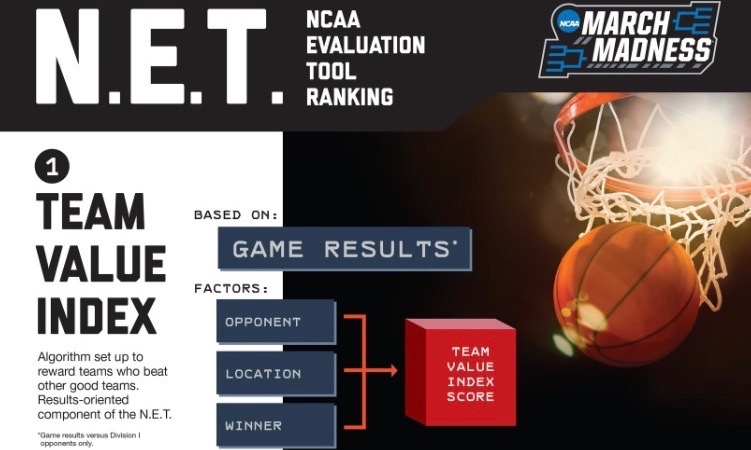NET or NCAA evaluation tool is the new RPI ranking, it will help the NCAA rank teams going into March Madness. Step 1, team value index or an algorithm that is set up to only reward teams for beating other good teams. Each team looking to make the NCAA tournament is given a “Team Value Index Score” based on opponent, location, and winner.
Step 2 is NET efficiency, which is simpler than a “Team value Index”! Net efficiency is team offensive efficiency minus defensive efficiency. Offensive efficiency is Field Goal Attempt minus Offensive Rebounds plus Turnovers plus Free Throw Attempts which is then divided by Total points. That is confusing but it just ends up being total points divided by total number of possessions. Then you just flip flop all of those stats to the opponent’s and you take opponent’s total points and divide that by the opponent’s number of total possessions, which then give you your teams defensive efficiency.
Step 3 is winning Percentage. Wins divided by total games played, easy as that! The more you win, the better your winning percentage will be.
Step 4 is adjusted win percentage. Adjusted to percentage of wins at home, on the road, or at a neutral site! It is a weighed value based on location and outcome of game result.
Finally, Step 5 is scoring margin. Team score minus opponent score. If you win the game 70 to 60, your scoring margin is +10. Math is essential for scoring margins.
In My Humble Opinion
The recent NET rankings come out on the 8th of February. The top ten teams are as follows: 1) Virginia, 2) Gonzaga, 3) Duke, 4) Tennessee, 5) Kentucky, 6) Michigan 7) Houston, 8) North Carolina, 9) Michigan State, and 10) Virginia Tech. I agree in large part with the new NET rankings, the only change I would make is to flip Virginia and Duke, and then flip Michigan State and Virginia Tech! I am all for a new ranking system based on numbers and not opinions.
We have to stop rewarding the Gonzaga’s and Nevada’s of the college basketball world for playing soft non-conference schedules and then play in non-competitive leagues. Gonzaga may be an except this year by beating the most talented college team I have seen, in Duke! All that should really matter when seeding teams is how many good teams you beat, where you played them, and basic team stats. Don’t over complicate evaluations where you let teams like Wichita State in 2014 get a 1 seed by beating teams like Drake, Bradley, and Evansville twice a year.
What are the NET Rankings?
Here's EVERYTHING you need to know. Be on the lookout for the first release 👀 pic.twitter.com/kdZwDEjFPS
— NCAA March Madness (@marchmadness) November 26, 2018




